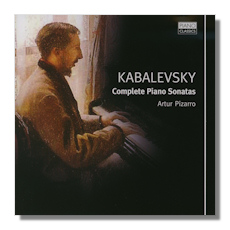
The Internet's Premier Classical Music Source
Related Links
- Kabalevsky Reviews
- Latest Reviews
- More Reviews
-
By Composer
-
Collections
DVD & Blu-ray
Books
Concert Reviews
Articles/Interviews
Software
Audio
Search Amazon
Recommended Links
Site News
 CD Review
CD Review
Dmitry Kabalevsky

Complete Piano Sonatas
- Piano Sonata #1 in F Major, Op. 6
- Piano Sonata #2 in E Flat Major, Op. 45
- Recitative & Rondo, Op. 84
- Four Preludes, Op. 5
- Piano Sonata #3 in F Major, Op. 46
Artur Pizarro, piano
Piano Classics PCL0005
Piano Classics is a new label and musical enterprise that was launched earlier this year (2011) to concentrate exclusively on recordings of piano solo and concertos. Using a variety of artists (some very well established and respected), Piano Classics' aim is to build a comprehensive "piano library" of the widest repertoire. Goals for marketing and the use of multiple distribution channels are ambitious. The hope is to collaborate with artist/concert managements, festivals, competitions, publishers and even piano manufacturers. Artur Pizarro's recording of the complete sonatas of Dmitry Kabalevsky (1906-1975) is one of the label's first releases. If it's anything to go by, Piano Classics deserves to succeed spectacularly.
Pizarro's playing is warm, sympathetic and wholly convincing in offering to us the music of a composer who is not so well known as he should be. Or rather, perhaps, he is known as something of a colluding ambassador for the Soviet establishment. (It has been suggested that Kabalevsky was Prokoviev's official "minder" after the latter returned permanently to Russia in 1935.) In fact, Kabalevsky's music is original, beautiful and very much sui generis. Yet there are remarkably few currently available recordings of the sonatas (particularly the first and second), which were composed in 1927, 1945 and 1946. Alexandre Dossin (on Naxos 8.570822), Christoph Deluze (on Praga 250279), and Murray McLachlin (on Olympia OCD266 & OCD267) have recorded all three; the third sonata has had half a dozen interpreters. While there are no other recorded performances of the Recitative and Rondo (Opus 84) than the one under consideration here, the Four Preludes (Opus 5) have also been recorded by Deluze again (Pavane 7513). So even were it not for Pizarro's excellence, this would be a good CD to acquire.
Kabalevsky's is music of real beauty. At times redolent of Brahms, at others of Shostakovich, it's still persuasive in its use of endearing melodies, a range of harmonies, an at times teetering atonality, and textures that are spare but suggest fuller, richer worlds. Although nowhere near so adventurous as many of his contemporaries, his music is nevertheless original, at times exciting, and goes way beyond mere affability to striking; though its largely diatonic world stops short of being in any way challenging.
Pizarro has quite a hill to climb… Kabalevsky famously singled out the performances of Gilels of his second sonata as particularly moving and skillfully played; no current recording of Kabalevsky by that artist now exists. But Pizarro's approach has the younger pianist's signature characteristics of great sensitivity, a deft and technically brilliant yet rather understated engagement with the music, and an invisible (or at least undetectable) intent to create an appropriately romantic aura about the music that stays with you – in the way that much of the Schubert solo piano repertoire does without any such ambience – for a long time afterwards.
The slow movement of the F Major sonata [tr.2], for example, is caressed out of the keyboard. But there's no over indulgence on Pizarro's part. And the movement's marking as (Andante) semplice is completely respected. Pizarro's playing, generally, in fact, never aims to attach to Kabalevsky's transparent yet characterful and substantial musical invention anything that's not there. He's also convincing in his sense of pace and variety. It would have been relatively easy to emphasize those elements of Kabalevsky's piano writing that may at first seem derivative&helip; Chopin, Liszt, Skriabin. But no.
If you don't own a set of the three Kabalevsky sonatas, are curious about the ways that Pizarro teases every drop of emotion and musical thought out of them, or want to explore "winning" piano music that's a little off the beaten track, then these recordings can be recommended. If they're a taste of what Piano Classics intends to do, then that project is very encouraging and deserves support.
Copyright © 2011, Mark Sealey.





















